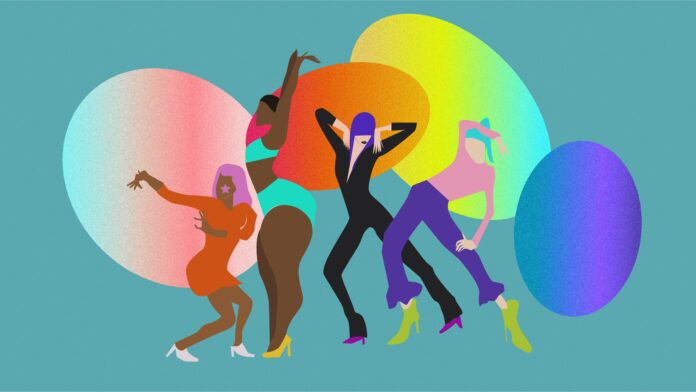Carlos Villanueva was at a college job fair when he found out about Appel Farm Arts & Music Center — a 115-acre nook in Elmer, New Jersey that hosts sleepaway summer camp for kids ages 8 and up. He eyed an open position — dance instructor — but worried his lack of training and experience with more traditional styles (like ballet) would hinder his chances of landing the role.
Villaneuva, who is part of the LGBTQ+ community, takes inspiration from drag and underground ballroom culture — developing choreography that blends hip-hop with historically queer approaches to performing.
To Villaneuva’s surprise, the camp’s director, Ella Quimby explained that Appel Farm previously hosted classes like this in the past and actually needed a teacher with those skills and interests to bring them back.
“I try really hard to be an advocate for folks of my identities in the spaces that I’m in because I didn’t ever really have that,” said Quimby, who is queer, Pacific Islander, and the child of an immigrant. “I had people who were kind and taught me things and shared with me but couldn’t often relate to my specific experiences.”
Quimby said her approach to cultivating opportunities at the camp has been influenced by her own desire to make sure kids feel seen and supported in the ways she wishes she had access to when she was young.
Working at Appel Farm — which she noted has been led by progressive values since its inception in the 1960 — has given her the chance to welcome and protect some of the most vulnerable young people, including LGBTQ+ youth.
“We are explicitly a trans-inclusive space,” she explained, adding that Appel Farm is one of few sleepaways in the United States that offers gender-inclusive bunking options (rather than only segregated housing). “We are a neurodivergent-friendly space. We work really hard to be as racially-conscious as we can be.”
Quimby aims to hire staff members who are used to and comfortable with that approach — people who value cultural exchange; have been involved in advocacy work; or want to continue learning about diversity, equity and inclusion. It’s not just about representation. It’s about empowering young people through this lens.
To Villaneuva — who goes by Krly at Appel Farm, this is one of the most important aspects of camp. His classes create learning opportunities for kids who are interested in performing but also offer community to LGBTQ+ kids who want to immerse themselves in queer culture.
“Most of them know a thing or two about queer culture in a general way,” he said about his campers, noting that the internet and shows like “Drag Race” have normalized LGBTQ+ expression. “But they don’t always get to live it.”
Many of the campers — even those with highly supportive and progressive caregivers — lack LGBTQ+ mentors or the ability to participate in queer-centered experiences for youth back home.
The relationships they develop in class — including with him as a teacher — offer people to share ideas with as they explore more than just movement. For instance, one of his students came to him for fashion advice while developing a drag persona.
Villaneuva’s class, which doubled in size this summer — during its second year in the catalog of offerings, introduces kids to intro-level vogue and drag skills. These include handography, duck walks, strutting, showmanship, beginner flips, splits, improvisation and ballroom-style posing. He also supports kids who have more advanced skills — but, despite their excitement and desire to try, none are quite ready for death drops.
“I want to make a safe space for them to do more than explore the history of it,” he said about LGBTQ+ dance styles. “I want them to explore what it feels to live it.”
Some of the dance majors come from strict disciplines and even perform in professional productions but don’t otherwise have the chance to explore such a free-form dance style in those spaces.
Villanueva, a gay man who also loves to explore androgyny and refuses to “follow the rules” when it comes to gender presentation and expression, is drawn to voguing because it also defies stereotypes — allowing dancers to explore movement in a way that is less constrained by formality.
“I always tell my kids, ‘Don’t be too firm. Just let loose,’” he said. “Do what the music is giving you in the moment.”
Some of the most popular moves among this year’s students included duck-walking and landing cartwheels with splits. Campers are given the opportunity to showcase these skills on stage with friends and family present. The crowd went wild for Villanueva’s dancers, who featured acrobatic spins and jumps into the performance.
But that wasn’t their only opportunity to show off.
His students also spent the summer teaching other campers how to vogue — and those queer-inspired moves made it to the camp’s prom-like dances, where kids often created a circle to vogue and strut in the middle.
“If they want to learn, I’m going to explain to them what this is about,” he said about newbies trying out moves that come from LGBTQ+ influence. “And if they don’t care, I’m just going to let them have fun.”

